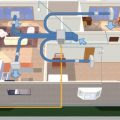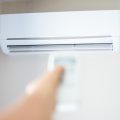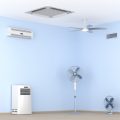A commercial HVAC system is a vital part of any business. It helps regulate the temperature and humidity in a space, providing a comfortable environment for employees and customers.
However, there are a few things to keep in mind regarding commercial HVAC systems. This article will touch on some basics to help you make the best decision for your business.
What is a Commercial HVAC System?
Most commercial HVAC (heating, ventilation, and air conditioning) systems are centralised, meaning that one large system serves the entire building.
This system is often used in office buildings, schools, hospitals, and other large commercial buildings. There are several advantages to using an HVAC system, including the following:
Increased Efficiency
An HVAC system is generally more efficient than multiple individual units because it can be better controlled and maintained. When all the heating and cooling units are centrally located, it is easier for the HVAC technicians to keep them running correctly.
Reduced Maintenance Costs
An HVAC system is also easier to maintain and more efficient. With one large system, fewer parts can break down or need repair. This can save the building owner money on maintenance and repair costs.
Improved Air Quality
An HVAC system can also improve the air quality in a commercial building. When the units are centrally located, they can be better monitored and controlled, which can help to reduce the amount of dust, pollen, and other allergens in the air.
Greater Comfort
An HVAC system can provide greater comfort for the occupants of a commercial building. When the units are centrally located, they can be better controlled to maintain a comfortable temperature throughout the building.
Increased Safety
An HVAC system can also increase the safety of a commercial building. When the units are centrally located, they can be better monitored and controlled, which can help to prevent fires and other hazards.
Enhanced Property Value
A commercial building with an HVAC system can often be worth more than a similar building without one. The HVAC system can add to the property’s overall value.
Improved resale value
If you ever decide to sell your commercial building, an HVAC system can help to increase its resale value. This is because potential buyers will often view a property with a central HVAC system as more valuable than a property without one.
Lower insurance rates
A commercial building with a central HVAC system may also qualify for lower insurance rates. This is because the HVAC system can help to reduce the risk of fires and other hazards.
Increased Energy Savings
An HVAC system can also help to save energy. When the units are centrally located, they can be better controlled, leading to reduced energy consumption. In addition, a central HVAC system can often be less expensive than multiple individual units.
Environmental Benefits
An HVAC system can also provide ecological benefits. When the units are centrally located, they can be better controlled, which can help reduce greenhouse gas emissions.
How Does the HVAC System Connect to the Building?
The HVAC system is typically connected to the building’s ductwork. The ductwork is a system of air ducts used to deliver and remove air.
They are typically made of sheet metal, fibreglass, or flexible materials. The ductwork also contains vents that allow air to enter the building from the outside. Ducts can also be used to distribute air from the HVAC system to different rooms within the commercial building.
How Do I Know if I Need a Commercial HVAC System?
The need for a commercial HVAC system will depend on the type of commercial building you have. For example, if you have a restaurant, you will need an HVAC system that can provide ventilation to remove cooking odours and fumes from the building.
Schools and hospitals will need an HVAC system that can ensure the air quality within the building is safe for occupants. Hotels will need an HVAC system that can provide a comfortable environment for guests.
You can always consult with a professional if you’re not sure if you need an HVAC system for your commercial building. They will be able to assess your needs and recommend the best solution for your commercial building.
How Much Does an HVAC System Cost?
There is no definitive answer to this question as the cost of an HVAC system will vary depending on several factors, such as the size of the system, the type of system, the climate, the geographical location, and the company installing the system.
How to Maintain a Commercial HVAC System?
Maintaining a commercial HVAC system is vital to ensuring the comfort of your customers and employees.
Preventive maintenance is key to keeping your HVAC system running smoothly. Have a qualified technician service your system at least once a year to clean and inspect all components.
Dirty air filters can restrict airflow and cause your system to work harder than necessary. Change your filters every month or two to keep your system operating efficiently.
Keep an eye on your HVAC system and note any strange noises or unusual behaviour. This will help you catch problems early and prevent minor issues from turning into big ones.
Dust and dirt can build up on your system’s components, making it less efficient and more likely to break down. Keep your system clean by vacuuming around the indoor unit and wiping down the outdoor unit monthly.
Conclusion
In conclusion, a commercial HVAC system is a great way to heat and cool a business. By following these tips, you can be sure that your commercial HVAC system will provide years of comfortable temperature control for your business. It is vital to research and find a reputable company to install and maintain your system.











